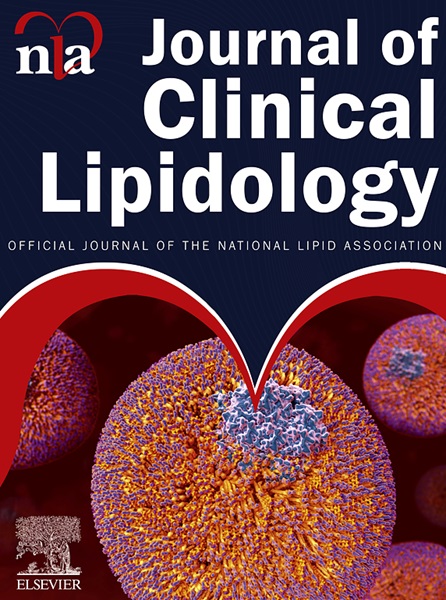Ketogenic diets exacerbating dyslipidemia: The role of lipid testing, genetic testing and advanced cardiac imaging
IF 4.6
3区 医学
Q2 PHARMACOLOGY & PHARMACY
引用次数: 0
Abstract
Background/Synopsis
Low carb/high fat ketogenic diets (LCHF/KD) have gained recent popularity in the United States for its benefits on weight loss and type 2 diabetes mellitus management. However, it can potentially exacerbate significant dyslipidemia, particularly in those with certain genetic predispositions. Individual response to ketogenic diets varies largely based on the quantity and composition of the diet as well as individual genetics.
Objective/Purpose
The hyper-response of dyslipidemia from a LCHF/KD has not been widely reported in the medical literature. In this article, we present three patients, and compare them to an additional eleven patients we found on a PubMed literature search, all of whom developed severe hyperlipidemia in response to LCHF/KDs, and in whom such a diet should have been otherwise contraindicated.
Methods
We studied a series of 3 patients along with 11 patients found on literature search (Table 1) all of whom underwent exacerbation of hyperlipidemia after initiation of a ketogenic diet. We compared age, sex, past medical history, medications, LDL levels pre- and post- ketogenic diet, genetic testing, and availability of imaging among our patients with those reported in the literature.
Results
Compared to the 11 patients found in the literature search, our patients were of similar age, had similar levels of hyperlipidemia exacerbation, and similar genetic mutations (apolipoprotein gene mutations) (Table 2). All 3 of our patients underwent cardiovascular risk screening with imaging and had cholesterol hyper-absorbance testing. One of our patients was found to be a cholesterol hyper-absorber and responded well to ezetimibe therapy.
Conclusions
Dyslipidemia is caused by various genetic factors including familial hypercholesterolemia (FH), caused by mutations in either LDL receptor, apolipoprotein B(ApoB) or proprotein convertase subtilisin/kexin type 9 (PCSK9) genes. Additionally, less commonly known genetic factors of dyslipidemia include apolipoprotein E (ApoE) variants. We recommend that all patients initiate ketogenic diet with an appropriate health care provider and have their baseline and routine lipid panel monitored. If there is a significant increase in their lipid profile, they should also undergo genetic testing, coronary CT angiogram for early detection of atherosclerosis as well as to establish clinically relevant plaque stages, and initiate lipid lowering therapy when clinically indicated. A suggested algorithm for patients initiating ketogenic diet is included in Figure 1.
生酮饮食加剧血脂异常:脂质检测、基因检测和高级心脏成像的作用
背景/简介低碳水化合物/高脂肪生酮饮食(LCHF/KD)最近在美国因其对减肥和2型糖尿病治疗的益处而受到欢迎。然而,它可能会加剧严重的血脂异常,特别是对那些有某些遗传易感性的人。个体对生酮饮食的反应在很大程度上取决于饮食的数量和组成以及个体的基因。目的/目的LCHF/KD对血脂异常的高反应在医学文献中尚未得到广泛报道。在这篇文章中,我们介绍了3名患者,并将他们与我们在PubMed文献检索中发现的另外11名患者进行了比较,这些患者都因LCHF/KDs而出现了严重的高脂血症,并且在其他情况下这种饮食应该是禁忌的。方法我们研究了3例患者以及文献检索中发现的11例患者(表1),这些患者在开始生酮饮食后高脂血症加重。我们将患者的年龄、性别、既往病史、药物、生酮饮食前后的低密度脂蛋白水平、基因检测和成像的可用性与文献报道的患者进行了比较。结果与文献检索中发现的11例患者相比,我们的患者年龄相似,高脂血症加重程度相似,基因突变相似(载脂蛋白基因突变)(表2)。我们所有的3例患者都进行了心血管风险影像学筛查和胆固醇高吸收测试。我们的一名患者被发现是胆固醇高吸收者,对依折麦布治疗反应良好。结论血脂异常是由多种遗传因素引起的,包括家族性高胆固醇血症(FH),由LDL受体、载脂蛋白B(ApoB)或蛋白转化酶枯草杆菌素/酮蛋白9型(PCSK9)基因突变引起。此外,不太为人所知的血脂异常遗传因素包括载脂蛋白E (ApoE)变异。我们建议所有患者在适当的医疗保健提供者的指导下开始生酮饮食,并监测他们的基线和常规脂质面板。如果他们的血脂水平明显升高,他们还应该进行基因检测,冠状动脉CT血管造影,以早期发现动脉粥样硬化,并建立临床相关的斑块分期,并在临床适应症时开始降脂治疗。对于开始生酮饮食的患者的建议算法包括在图1中。
本文章由计算机程序翻译,如有差异,请以英文原文为准。
求助全文
约1分钟内获得全文
求助全文
来源期刊
CiteScore
7.00
自引率
6.80%
发文量
209
审稿时长
49 days
期刊介绍:
Because the scope of clinical lipidology is broad, the topics addressed by the Journal are equally diverse. Typical articles explore lipidology as it is practiced in the treatment setting, recent developments in pharmacological research, reports of treatment and trials, case studies, the impact of lifestyle modification, and similar academic material of interest to the practitioner.
Sections of Journal of clinical lipidology will address pioneering studies and the clinicians who conduct them, case studies, ethical standards and conduct, professional guidance such as ATP and NCEP, editorial commentary, letters from readers, National Lipid Association (NLA) news and upcoming event information, as well as abstracts from the NLA annual scientific sessions and the scientific forums held by its chapters, when appropriate.

 求助内容:
求助内容: 应助结果提醒方式:
应助结果提醒方式:


